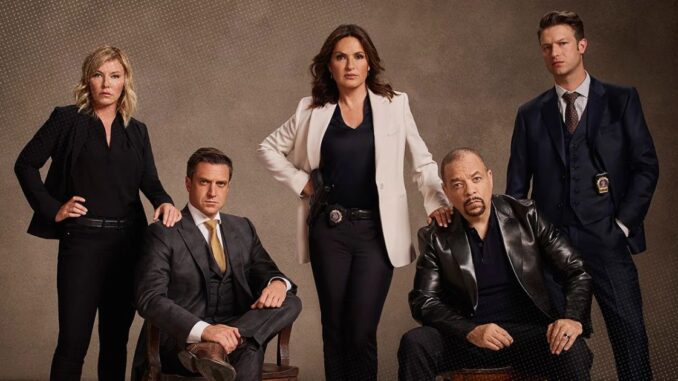
The Unseen Anchor: Christopher Meloni and Hargitay Reunion and What It Means for SVU
For over two decades, Law & Order: Special Victims Unit has been a constant, a procedural bedrock in the ever-shifting landscape of television. Yet, for a significant portion of its storied run, a palpable void lingered, an emotional echo that no amount of excellent storytelling or character development could entirely fill. This void was the absence of Detective Elliot Stabler, played with brooding intensity by Christopher Meloni, and the missing half of the most iconic partnership in television history: his profound, often unspoken, bond with Olivia Benson, brought to life with unparalleled grace and resilience by Mariska Hargitay. The long-awaited, almost mythic reunion of these two actors, and by extension, their characters, was more than just a ratings boon or a nostalgic fan-service moment; it was a profound re-anchoring of SVU to its emotional core, a redemptive narrative arc that redefined its past, invigorated its present, and fundamentally reshaped its future.
The initial shock of Stabler’s abrupt departure in 2011 was akin to a cataclysmic shift for SVU. For twelve seasons, Benson and Stabler had been the show’s twin pillars, their partnership a complex, combustible, yet utterly unbreakable bond forged in the crucible of heinous crimes. Their dynamic – his simmering rage tempered by her empathetic intellect, their shared understanding communicated through searing gazes and subtle nods – was the show's beating heart. When Meloni left, the show continued, of course. Olivia Benson grew, evolved, became Captain, a mother, a leader, a survivor in her own right. Her journey was compelling and necessary, proving SVU could stand on its own. Yet, even as Benson soared, the specter of Stabler, the unfinished conversation, the unresolved emotions, remained an unseen anchor, holding back a full reckoning with her own past. The show had moved forward, but a part of its emotional history was left frozen, unaddressed.
The reunion, therefore, was not merely a character returning; it was the re-establishment of a crucial narrative thread that had been severed. When Stabler first reappeared, initially in a cross-over event that launched Law & Order: Organized Crime, the palpable electricity between Meloni and Hargitay was immediate, undeniable. It wasn't just two actors hitting their marks; it was the re-ignition of a chemistry so potent it had defined an era of television. Their first face-to-face scene in a decade, fraught with unspoken grief and simmering resentment, delivered a visceral punch to viewers, an audible gasp of collective relief and recognition. This wasn't just nostalgia; it was the raw, unvarnished portrayal of a relationship profoundly impacted by time, trauma, and inexplicable absence.
For SVU itself, Stabler's return meant the opportunity for closure, healing, and a deeper understanding of Olivia Benson. For years, viewers had watched Benson carry the weight of Stabler's sudden exit, the pain of his silence, the implications of a partnership that ended without a word. His reappearance, driven by personal tragedy and a desperate need for answers, allowed SVU to finally address this gaping wound. Their subsequent interactions, both confrontational and tender, provided the long-awaited emotional therapy session for both characters and audience. Benson’s guardedness, Stabler’s attempts at explanation, their shared grief over Kathy Stabler – all of it allowed the show to delve into the psychological ramifications of their intertwined past in a way it never could before. This isn't just about rekindling a friendship; it's about processing a shared trauma that shaped them both, individually and collectively.
Moreover, the reunion has subtly, yet significantly, re-centered SVU on its emotional bedrock. While the show has always tackled difficult, often ripped-from-the-headlines cases, its enduring appeal has always been its human core – the empathy of its detectives, the resilience of its survivors. By bringing Stabler back into Benson's orbit, even if primarily through the lens of a spin-off, SVU gains a powerful narrative tool. Olivia Benson is no longer a character whose personal life is largely devoid of her most significant relationship; she is now a woman grappling with the return of a figure who shaped her identity, her ethics, and her understanding of partnership. This allows SVU to explore themes of forgiveness, accountability, and the enduring power of human connection within the framework of its weekly procedural. It reminds viewers of the very roots that made the show so compelling in its early days, even as it continues to evolve and break new ground.
Ultimately, the reunion of Christopher Meloni and Mariska Hargitay is more than a television event; it’s a testament to the enduring power of character and narrative fidelity. It has provided the long-missing piece of SVU's emotional puzzle, allowing the show to reconcile its past with its present. For Olivia Benson, it is the return of her unseen anchor, the person who understands her deepest vulnerabilities and darkest battles like no other. For SVU, it means a richer, more complex narrative tapestry, a show that can now fully embrace its own history while confidently striding into its future, fortified by the renewed strength of its most iconic bond. The echoes of their partnership, once a painful reminder of what was lost, are now a vibrant, living force, pulsating at the very heart of the Special Victims Unit once more.
